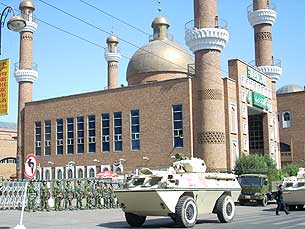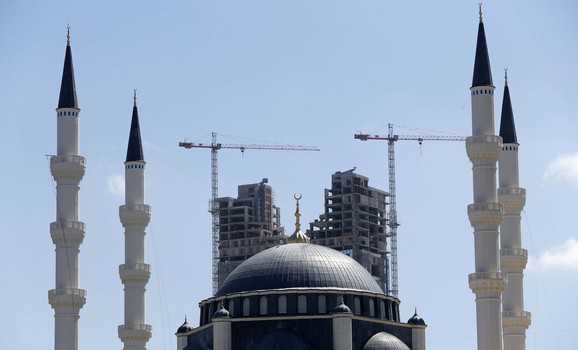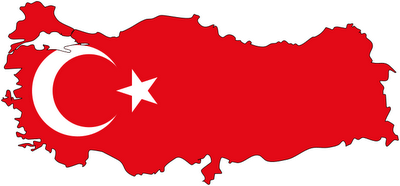Witnesses say thousands of armed Han Chinese are on the streets of the Xinjiang Uyghur Autonomous Region’s capital vowing revenge after a deadly clash.
 HONG KONG—An angry crowd of several thousand ethnic majority Han Chinese has gathered in Urumqi following weekend riots, amid a welter of rumors surrounding deadly clashes between Muslim Uyghurs and police, according to initial reports from foreign journalists and exiled Uyghur groups overseas.
HONG KONG—An angry crowd of several thousand ethnic majority Han Chinese has gathered in Urumqi following weekend riots, amid a welter of rumors surrounding deadly clashes between Muslim Uyghurs and police, according to initial reports from foreign journalists and exiled Uyghur groups overseas.
“Chinese civilians, using clubs, bars, knives, and machetes, are killing the Uyghurs,” the Munich-based World Uyghur Congress said in a statement.
“They are storming the university dormitories, Uyghur residential homes, workplaces, and organizations,” it said, accusing the mob of killing unprotected Uyghur civilians.
Foreign correspondents on the ground in Urumqi said they saw armed crowds of thousands of Han Chinese running through the capital of the northwestern Xinjiang Uyghur Autonomous Region (XUAR).
“Two police officers just escorted a Uyghur woman with a baby through a Han crowd with clubs by the People’s Theater,” Time correspondent Austin Ramzy wrote via the real-time micro-blogging platform Twitter.
Telegraph correspondent Peter Foster reported via Twitter from Urumqi that thousands of armed Han Chinese had gathered near a mosque in Shanxi Alley in downtown Urumqi.
Police tried to calm the crowd, which was armed with “snooker cues, axes, machetes, baseball bats, metal scaffolding poles, cattle prods, and a plastic mop handle,” according to Foster’s updates.
Meanwhile, Al-Jazeera correspondent Melissa K. Chan tweeted, also from Urumqi, “A Han Chinese man with a stick just tore open our car door to beat our producer. Averted just in time.”
Chan said Urumqi was now under martial law. Official media also reported further unrest. Two separate estimates by foreign journalists at the scene put the crowd at around 10,000.
‘Troops everywhere’
Despite Chinese officials’ decision to cut off the Internet and mobile phones, pictures, videos and updates from Urumqi poured into social-networking and image-sharing Web sites including Twitter, YouTube, and Flickr.
A Han Chinese employee at a youth hostel in downtown Urumqi said, “We have a curfew now and troops are everywhere.”
“We can still can drive on the streets—but I don’t know if the situation will get worse so I stored some bottles of water and instant noodles,” the employee said.
“More Han Chinese live in Urumqi than Uyghurs now,” he said. “Many Uyghurs are afraid to go out now. They have their own friends, and we won’t try to be their friends.”
“Before it was them attacking us. Now it’s our turn to attack them,” another Han Chinese resident said.
But a municipal official downplayed the tensions.
“We are coming to work as usual. What do you mean, take to the streets? We will see what happens. Ask again later,” the official said.
“Of course there have always been ethnic separatists. They have existed for a long time. They are always looking for ways to make trouble. They will do it as soon as they spot an opportunity,” the official added.
Chaos and vigilantes
Police fired tear gas repeatedly at the protesters, who refused to disperse. Police were blocking them from getting through to an area of Urumqi populated by Uyghurs, who authorities have blamed for riots on Sunday that left 156 people dead and more than 1,000 injured.
China’s state-run Xinhua news agency reported similar scenes in other parts of Urumqi.
“Chaos was seen in a number of places in Urumqi on Tuesday afternoon,” the official Xinhua news agency reported.
Back in Urumqi, al-Jazeera’s Chan tweeted: “There is no right or wrong anymore. Just vigilantes, Han and [Uyghur]. Mostly men but some women and even children.”
“I asked a Han Chinese girl if she was scared. ‘Yes, but this is to defend my country,’ she says with stick in hand.”
The World Uyghur Congress said it had received several reports of deaths at the hands of Han mobs in different locations in Xinjiang, which is home to a population of Turkic-speaking Uyghurs, many of whom oppose Beijing’s rule, and a growing influx of migrants from the rest of China.
Ethnic tensions have simmered for decades, with Uyghurs saying they are subject to racial discrimination and have scant access to the fruits of China’s breakneck economic growth of the past 30 years.
China has said some overseas Uyghur separatist groups are connected with international terrorism.
Foster reported via Shanghai-based Telegraph correspondent Malcolm Moore that some of the crowd were comparing exiled former Uyghur businesswoman Rebiya Kadeer to al-Qaeda mastermind Osama bin Laden.
The Congress statement said: “[A] Uyghur young man was mutilated on [Urumqi’s] Dongbeilu. A Uyghur woman who was carrying a baby in her arms was mutilated along with her infant baby on Huanghelu.”
Witnesses on the ground said the mood of the crowd was ugly, with a group of Han Chinese protesters attacking Telegraph correspondent Foster and his assistant, who were protected by police.
The Uyghur Congress said Chinese security forces were “not taking any action” against the attackers, and that it had received telephone threats from “ethnic Han Chinese” at its headquarters in Munich.
A Foreign Ministry spokesman said Tuesday that Sunday’s violence in the region was not a peaceful protest, but “evil killing, fire-setting, and looting.”
Foreign Ministry spokesman Qin Gang told a regular news briefing: “Anybody calling the violence a peaceful protest is trying to turn black into white in an attempt to mislead the public.”
Urumqi Communist Party chief Li Zhi went to the scene, addressing the crowd and calling for calm. The crowd roared soon after, before rushing off in the other direction, witnesses said.
Earlier, Li had told reporters: “We immediately reinforced the emergency prevention and control measures after the riots started. Security was dispatched to the four main areas of unrest, and they swiftly took care of the matter in accordance with the law.”
Internet curbs, media strategy
Also Tuesday, Li confirmed at a news conference that authorities there had cut off Internet access in parts of Urumqi to stop the flow of information that it saw as a dangerous threat.
“We cut the Internet connection in some areas of Urumqi in order to quench the riot quickly and prevent violence from spreading to other places,” Li said.
The Paris-based media watchdog Reporters Without Borders accused authorities of wanting to see Urumqi “cut off from the rest of the world.”
“Once again, the Chinese government has chosen to cut communications in order to prevent the free flow of information. We firmly condemn this behavior,” the organization said in a statement.
Many phone lines have been disabled since the violence erupted, but others remain in working order.
Netizens inside China said the personal update service Twitter, which is frequently used to transmit keywords, news, and photos around the Chinese Web at a speed that eludes China’s censors, was blocked.
“Twitter is blocked: In another act of net-nanny folly Twitter.com has been blocked on the Chinese mainland,” media analysis blog Danwei commented via the service Monday.
Other users said the service was still accessible using third-party applications elsewhere on the Web.
They said sensitive keywords such as “Xinjiang” were currently returning no search results on the Chinese Web, either.
“Why is it that the moment something happens, the first thing they think of is blocking it?” user Keso tweeted. “Surely the fact that they do this shows that there are skeletons in the closet?”
Authorities have meanwhile taken the unusual step of bringing foreign reporters to Urumqi to learn about the incident and setting up a media center in a city hotel.
This contrasts with Beijing’s virtual blackout on previous instances of unrest, such as the Tibetan uprising of early 2008, but is in keeping with its handling of media immediately after the May 2008 Sichuan earthquake.
But that initial openness ended amid allegations that corruption had resulted in shoddy construction of school buildings that collapsed in the quake.
Shenzhen-based media commentator Zhu Jianguo said official media reports seemed to be intensifying conflicts rather than soothing them.
“They are putting out information at a much faster speed than previously, but their approach is exactly the same as it always has been,” Zhu said, suggesting the coverage was one-sided.
“Now the incident has erupted into racial conflict, and it’s not a simple racial conflict either. It’s all over the country—it’s a crucial point at which the government faces off against the people.”
Original reporting by RFA’s Uyghur, Mandarin, and Cantonese services. Written for the Web in English by Luisetta Mudie. Edited by Sarah Jackson-Han.
Radio Free Asia








